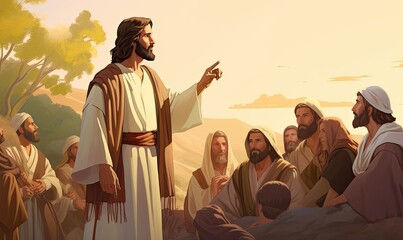
In the Gospel reading for July 14, St. Mark told us that no sooner had Jesus called His twelve Apostles, He sent them out, two by two, on their first missionary journey. Matthew, Mark and Luke recount this same story, but each told the story a little differently because each was teaching a different lesson to their faith communities using that story.
Each Gospel writer focused on why the Apostles were sent.
None of the evangelists wrote about where the Apostles went or gave any details about what they did, or indicated how long they were on their first journey without Jesus being with them. Rather, each Gospel writer focused on why the Apostles were sent. The July 14th Gospel reading ended with Mark stating that “they anointed with oil many who were sick and cured them” [Mk 6:13]. So, Mark’s message was that the Apostles were sent to heal others, not to admonish them, not to correct their thinking – but first, to heal.
Mark continued the story in the Gospel reading for July 21st. The Apostles returned, overjoyed in having been empowered to bring the caring love of God to others. And Jesus said to them: “Come away by yourselves to a deserted place and rest a while” [Mk 6:31a]. This set into motion the later feeding of the 5000, which we will hear about in the Gospel reading for July 28th.
What’s the lesson here that’s meant for us in our times?
So, what are we to take from all this? There must be something significant in this story, spread over three consecutive Sundays, each episode leading into the next. But, what’s the lesson here that’s meant for us in our times?
Mark was writing to a community of Jewish Christians who had been forcefully driven out of their homes and worship spaces and banished from Rome some years earlier. 1 They were people who were hurting. Using this story, Mark reminded them that they too, through their Baptism, had been sent to care for others who were hurting.
Often the lesson or message intended in Scripture is not explicitly stated;
it’s left for the listener to discern.
We should notice that Mark never mentioned Baptism in his recounting the story; he never mentioned that his listeners had been sent to do something. He left it for them to recognize it in themselves. And the same applies to us. That’s one of the most important insights we can have about Scripture. Often the lesson or message intended in Scripture is not explicitly stated; it’s left for the listener to discern.
By our Baptism we too were sent to be healers of others.

Well, we too are living in a time when many are hurting, and not just physically; but hurting emotionally, hurting spiritually, often just angry over matters of politics, children’s education, lack of opportunities, loss of hope. And we are not unaffected by it either. We hurt too: for ourselves, for our community, for our country. But by our Baptism we too were sent to be healers of others – in how we express care for them, how we listen first, how we handle disagreements over deeply held issues. We’re not asked to compromise or surrender our beliefs, rather to express our beliefs in a compassionate way and recognize that others hurt too.
Those we disagree with should not be considered as vile opponents, people intent on harming us in some way. They’re people who are possibly hurting, as we are. They just see things differently than we do.
We have been sent to anoint with the oil of compassion
those around us who are hurting.
Our mission is little different from that Jesus sent His first Apostles on; little different than what Mark prompted his community to. We too have been sent to be healers; to anoint with the oil of compassion those around us who are hurting.
‘Till next time,
Dcn Bob Evans
07/25/24
__________________
1. Mary Healy, The Gospel of Mark: Catholic Commentary on Sacred Scripture, (Grand Rapids: Baker Academic Press, 2008).
Scripture references
Mark 6:13; 6:30-34

Kommentare